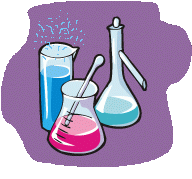


Description of experiment
Below follows a plain text transcript of the selected experiment.
![]()
Needed compounds:
-----------------
hydrochloric acid : HCl
sulphuric acid : H2SO4
potassium chlorate : KClO3
potassium bromate : KBrO3
Class:
------
elem=Br,Cl
redox
Summary:
--------
Although the redox potential from bromate to bromine is higher than the
potential from perchlorate to chlorate, when chlorate and bromate are
mixed, then no reaction occurs. When some hydrochloric acid is added,
then a reaction occurs with the chloride ions.
Description:
------------
Dissolve some potassium chlorate and potassium bromate in dilute sulphuric
acid (appr. 1 mol/l): Both solids dissolve (requires a fairly long time and
a lot of shaking) and the liquid remains colorless. From this can be concluded
that no reaction occurs. If bromate were reduced, then the color of bromine
could be observed, but this is not the case, hence no reaction.
Add some hydrochloric acid (appr. 30%): The liquid immediately becomes yellow
and a pungent smell of chlorine can be observed.
![]()